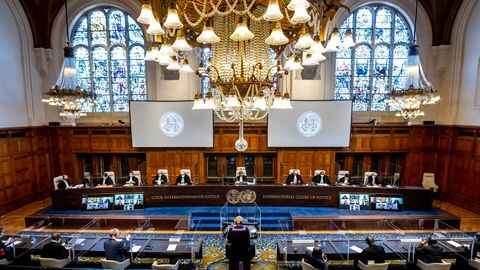In the battle against the climate disaster, activists expect that the ICJ justices’ ruling would have a significant impact.
Next week, the world’s highest court will begin holding first-of-its-kind hearings to determine a “legal blueprint” for how nations should safeguard the environment from harmful greenhouse gases and what would happen if they didn’t.
The International Court of Justice in The Hague will receive submissions from attorneys and representatives from over 100 nations and organizations starting on Monday, the most ever.
Others, however, worry that the UN-backed request for a non-binding advisory opinion will not have much of an influence and that it might take months or even years for the top court of the UN to provide one.
The Peace Palace hearings take place only days after a contentious climate agreement at the COP29 summit in Azerbaijan, which mandated that industrialized nations contribute at least $300 billion annually to climate funding by 2035.
Rich polluters’ pledge has been criticized by poorer nations as being insultingly low, and the final agreement omitted a global commitment to phase out fossil fuels that warm the earth.
“No remote threat”
In a resolution passed last year, the UN General Assembly asked the justices of the International Court of Justice two important questions.
First, what responsibilities did states have under international law to prevent greenhouse gas emissions from affecting the Earth’s climate system?
Second, in cases where governments “by their acts and omissions, have caused significant harm to the climate system and other parts of the environment,” what are the legal ramifications under these obligations?
The legal obligations of governments for damage done to smaller, more vulnerable nations and their citizens were also connected to the second query.
This was particularly true for nations that were threatened by increasing sea levels and more extreme weather patterns in regions like the Pacific Ocean.
For us, “climate change is not a distant threat,” stated Vishal Prasad, who is the director of the Pacific Islands Students Fighting Climate Change (PISFCC) organization.
Our lives are currently being reshaped by it. Our islands are under danger. A few days before the hearings began, Prasad told reporters, “Our communities are experiencing disruptive change at a pace and scale that previous generations have not experienced.”
Before the climate issue was brought to the UN, Prasad’s group of 27 students led a consensus-building effort among Pacific island states, including his own home country of Fiji, to bring it to the ICJ in 2019.
The decision to get an advisory opinion from the ICJ was unanimously approved by the General Assembly last year.
“Legal blueprint”
Climate supporters did not anticipate the ICJ’s ruling “to provide very specific answers,” according to Joie Chowdhury, a senior attorney at the Center for International Environmental Law, which is located in the US and Switzerland.
Rather, the court would offer “a legal blueprint in a way, on which more specific questions can be decided,” contrary to her prediction.
At some point next year, she anticipated hearing the judges’ conclusion, which “will inform climate litigation on domestic, national, and international levels.”
“One of the questions that is really important, as all of the legal questions hinge on it, is what is the conduct that is unlawful,” Chowdhury stated.
“That is very central to these proceedings,” she stated.
About 98 nations and 12 organizations and NGOs are anticipated to submit, including some of the biggest carbon polluters in the world, such as the top three greenhouse gas emitters, China, the United States, and India.
Vanuatu and the Melanesian Spearhead Group, which also comprises Indonesia, East Timor, the vulnerable island nations of Fiji, Papua New Guinea, and Solomon Islands, will make the opening statement on Monday.
Organizations such as the EU and the Organization of the Petroleum Exporting Countries are expected to make statements at the conclusion of the two-week hearings.
Prasad of the PISFCC stated, “With this advisory opinion, we are not only here to talk about what we fear losing.”
“We’re here to talk about what we can protect and what we can build if we stand together,” he stated.






